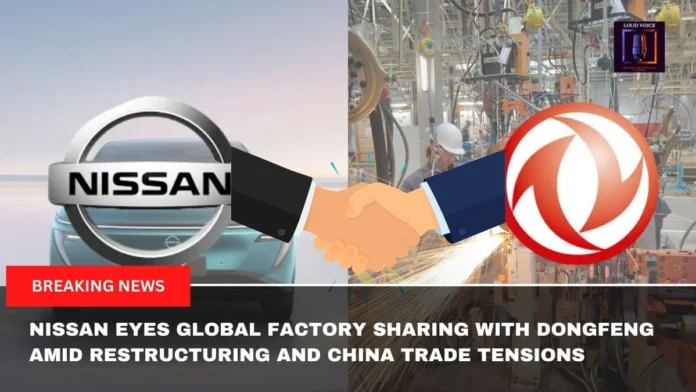Key Takeaways
- Nissan eyes global factory sharing with Dongfeng as part of its business reorganization strategy to address declining sales.
- The Japanese automaker plans to cut 15% of its workforce, including 11,000 new layoffs.
- Nissan reassures commitment to its Sunderland plant despite global shakeups.
- UK–China relations face strain amid UK-US tariff agreements and Chinese diplomatic pushback.
- Battery production investment in Sunderland offers hope for UK’s green automotive future.
Introduction
As global carmaker Nissan struggles with falling sales and mounting losses, the company is signaling a bold new chapter in its global strategy—sharing factories with Chinese state-owned partner Dongfeng. The announcement marks a significant pivot for the Japanese firm, which is simultaneously grappling with internal upheaval and external geopolitical pressures.
This strategic shift comes as Nissan undergoes deep restructuring, with plans to cut a staggering 11,000 jobs and shutter seven production plants worldwide. Though the company has yet to disclose which regions will be affected, the move underscores the severity of Nissan’s global downturn, particularly in core markets like the U.S. and China.
Yet amidst the chaos, there’s a surprising silver lining—Nissan’s steadfast commitment to its UK operations.
Sunderland Plant Remains Central to Nissan’s Future
Speaking at a Financial Times conference, Nissan’s newly appointed CEO Ivan Espinosa offered reassurance about the future of its UK facility.
“We have announced that we are launching new cars in Sunderland… In the very short term, there’s no intention to go around Sunderland,” said Espinosa.
The Sunderland plant, which employs around 6,000 workers, has long been a cornerstone of Nissan’s European manufacturing presence. Its future now appears more secure, buoyed by recent developments in the electric vehicle (EV) space.
Earlier this month, AESC—Nissan’s battery partner—secured a £1 billion funding package from the UK government to build a state-of-the-art battery facility in Sunderland. The plant will supply batteries for the Leaf and Juke electric models and is expected to create hundreds of high-quality jobs in the region.
UK Chancellor Rachel Reeves, who visited the site, said the investment would “deliver much-needed high-quality, well-paid jobs to the North East.”
Deepening Ties with Dongfeng: A New Production Ecosystem
Nissan’s partnership with Dongfeng isn’t new—the companies have collaborated for over 20 years, jointly building vehicles in Wuhan. But this latest announcement marks a more expansive vision.
According to Nissan, the firm is now open to bringing Dongfeng “into the Nissan production ecosystem globally.” That could mean co-assembling cars in regions outside China, leveraging Dongfeng’s production efficiency and scale to cut costs and navigate tough global conditions.
The decision is as much about survival as it is about strategy. Nissan has seen its market share in China—the world’s largest car market—erode due to intense local competition and rapidly falling vehicle prices. By more closely aligning with a state-backed local player, Nissan hopes to claw back lost ground.
Layoffs, Losses, and Leadership Changes
This week’s announcement of 11,000 job cuts adds to a previous wave of 9,000 layoffs disclosed in November, bringing the total to roughly 20,000—or 15% of Nissan’s global workforce.
The layoffs form part of a broader cost-cutting initiative aimed at reducing global production capacity by 20%. Nissan says this will allow it to operate more efficiently and pivot toward high-demand vehicle segments like EVs and hybrids.
Meanwhile, internal leadership turmoil continues. Earlier this year, merger talks with rival Japanese automaker Honda collapsed, reportedly due to disagreements over a multi-billion-dollar tie-up. The fallout led to the departure of then-CEO Makoto Uchida, who was succeeded by Espinosa, a company veteran known for his work in motorsports and long-term planning.
Trade Tensions Add to its Challenges
Just as Nissan charts a new course, international trade disputes are adding layers of complexity. The UK’s recently negotiated tariff agreement with the U.S. has stirred unease in Beijing, with the Chinese government seeking clarifications about how the deal might impact Chinese interests.
The agreement eases Trump-era tariffs on metals and cars but includes provisions obliging the UK to “promptly meet” U.S. demands regarding the security of steel and aluminum supply chains.
In response, a spokesperson from the Chinese Embassy in London stated that China was firmly opposed to any party pursuing a deal that could harm the country’s interests, and warned that China would take appropriate action if such a situation were to occur.
While UK officials insist the agreement does not amount to a veto on Chinese investment, the diplomatic friction is palpable—and it could affect companies like Nissan, which straddle both UK and Chinese interests.
Can Nissan Turn Things Around?
Financially, the company remains in rough waters. It recently reported a massive annual loss of ¥670 billion ($4.6 billion), much of it attributed to poor sales and lingering effects from global trade tensions, particularly during the Trump administration’s tariff hikes.
Still, Nissan appears determined to find a path forward. By streamlining operations, deepening its partnership with Dongfeng, and embracing EV innovation in the UK, the automaker is laying the groundwork for a leaner, more focused future.
Whether it can succeed depends on several moving pieces—global demand recovery, political diplomacy, and the ability to deliver innovation that resonates with consumers in the hyper-competitive car market.
Conclusion
Nissan’s willingness to share production lines with Dongfeng signals not just a strategic pivot, but a survival tactic in a fiercely competitive and politically complex global auto market. While job cuts and losses paint a sobering picture, investments in EV infrastructure in Sunderland and a renewed commitment to key partnerships could drive the automaker toward a more resilient future. In times of disruption, adaptability is often the only road to relevance—and Nissan seems ready to shift gears.


